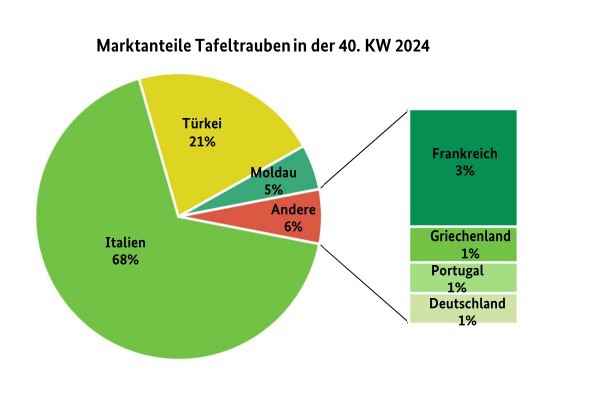Italian grape offerings dominated the scene, with many different Arra and IFG varieties in stock. Italia and Crimson Seedless gained a little in importance, while Red Globe lost relevance. According to BLE, Victoria, which used to set the tone, had almost completely disappeared from marketing. From Turkey, the main varieties were Sultana and, to a lesser extent, Crimson Seedless: both varieties were marketed quickly in an appealing quality.

Moldova was supplied from the Republic of Moldova: They cost €20.- to €21.50 per 9.3-kg pack in Frankfurt. Crimson Seedless and Sugar Crisp from Portugal also appeared there; customers were asked to pay €4 per kg for the latter. In Hamburg, Brazilian Sugar Crisp was forwarded directly from the harbour to food retailers. Greek Thompson Seedless and French Alphonse Lavallèe and Muscat de Hambourg supplemented the transactions. Demand was very favourable and could still be satisfied without major efforts. Valuations generally remained at the previous week's level, apart from minor fluctuations.
Click here to go directly to the full market and price report.
Apples
Domestic Elstar, Boskoop, Jonagold and Tenroy formed the basis of a wide-ranging supply. Overall, the supply had expanded noticeably and the selection of varieties was also more extensive. Interest could not always keep pace with the increased supply.
Pears
Santa Maria and Abate Fetel from Italy and Santa Maria from Turkey dominated. From Germany, mainly Alexander Lucas arrived, Williams Christ, Xenia, Gellert, Gute Luise and, more recently, Bosc's bottle pear completed the range.
Plums
The season ended unspectacularly: deliveries from Germany and some Eastern European countries were limited, and the quality also occasionally left something to be desired.
Lemons
The first appearance of Turkish Meyer lemons and Enterdonato lemons of the same origin brought movement to the supply. The increased arrival of Spanish Primofiori also put the dominant South African Eureka under pressure.
Bananas
On the whole, business was calm. Demand improved in certain areas, but there was still room for improvement locally. Demand was adequately covered on all markets
Cauliflower
Domestic batches obviously dominated and were monopolised in some places. The autumn weather had certainly improved the accommodation options. This sometimes had an impact on prices, which rose in some places.
Lettuces
Domestic, Dutch and Belgian lettuce lots were available. The offers generally met with a favourable response. Prices rose in some places due to volume or higher purchase prices.
Cucumbers
The assortment of snake cucumbers consisted of German, Dutch, Spanish and Belgian offerings, although not all countries appeared on all markets.
Tomatoes
There was movement in the product range: Although the Dutch and Belgian offerings continued to set the tone, the presence of Turkish imports apparently expanded. The Spanish season also picked up speed, as can be seen from the increased relevance of the fruits.
Sweet peppers
Dutch and Spanish offerings formed the basis of the supply, with Turkish offerings following in terms of importance. There was routine handling almost everywhere, and demand was met without difficulty.
Source: BLE
